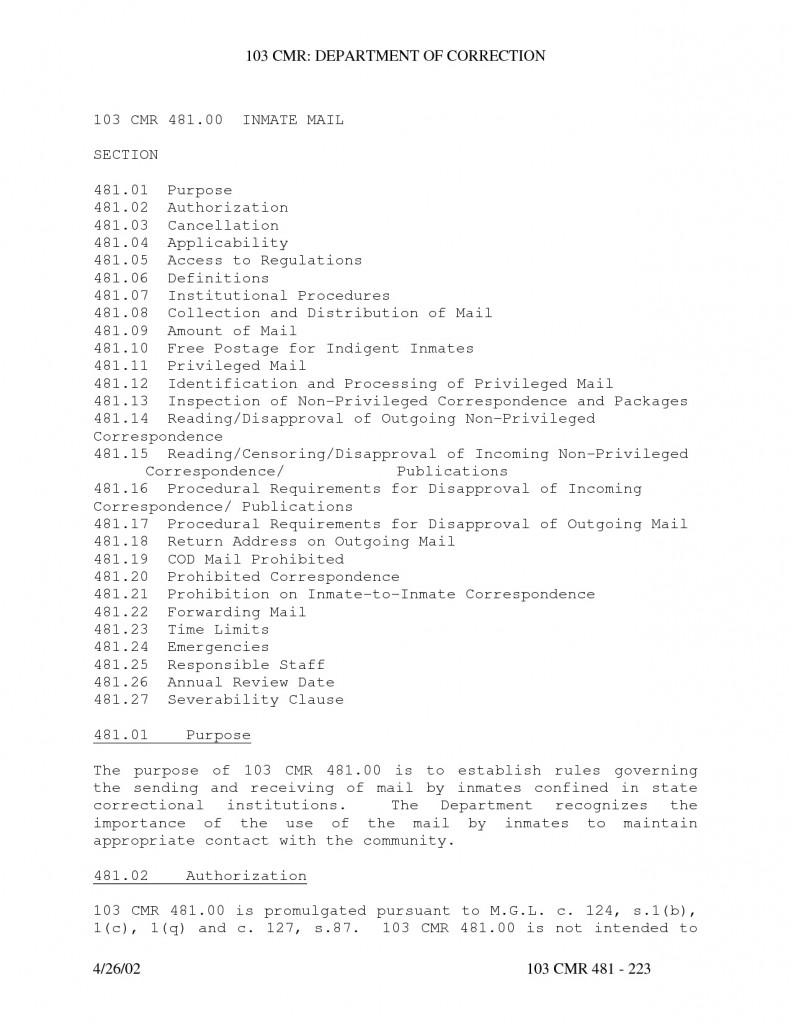[In which much is made of permission slips, fluoroscopes, mail delivery, and patience…LOTS AND LOTS of patience….]
Our story thus far:
- We were given $$$ to buy books
- We decided which books we needed
- We chose an approved vendor from which to buy the books
- We submitted requisite paperwork
- We received approved paperwork
- We secured permission to visit book store
- We bought books
- We picked up books
- We delivered books to prison ‘Bundle Room’
Now we need to get approval to get the books inside. Even though we have an approved State purchase requisition to show, we still need authorization to bring this stuff in. This requirement is found in the addendum to the Norfolk Procedural Statement covering 103 Code of Massachusetts Regulations 478, “Library Services.” And the authorization we’re required to get is known as an ‘Authorization to Enter’ form, or ‘A TO E.’
I log onto the Department intranet, locate the form/print it out, and then fill out the form with the following information:
Description of items to enter institution
Purpose of items entering institution
Date items will enter
Time of day items will enter
Destination
Contact staff
Then there’s a section at the bottom for the signature of the Deputy Superintendent and a place for her to date her signature.
Last Friday evening, I walked the quarter-mile to the deputy’s office and secured her signature on the A TO E. Because the Bundle Room closes at 3PM, I cannot submit this until the next time I’m in.
Because Monday was a Massachusetts holiday (Patriots’ Day), on Tuesday afternoon I deliver the A TO E to our ‘Bundle Room’ officer.
On Wednesday afternoon, when I started my shift, one of my clerks informed me that the Bundle Room truck made a delivery to our Supply House. There were no boxes of books on the truck. This truck only comes into the prison once a week. Hurry-up-and-wait.
My guess is that the Bundle Room officer hasn’t had the time to fluoroscope each of these books in all six boxes. It’s a procedure, and he’s a thorough kind of guy. We need to wait until next week. Patience is, we are assured, a virtue. Bullshit. I want my books! Notice I said “my” books. Ridiculous. My books are resting here at home on their shelves.
Here’s another thing — Just because I have the Deputy’s approval to bring in (6) boxes of books from NE Mobile Book Fair doesn’t mean the Library will receive everything that I’ve selected for purchase. The Bundle Room officer has the authority to question any material in those boxes, and bring it to the attention of either the Deputy or the Director of Security. Language in 103 CMR 481 gives him this authority.
The last time a book I bought was challenged was about six months ago. I bought a Madonna biography, inside of which were color photos of her body in various stages of undress. For their own reasons, this Department has become strict about nudity. I do not agree with their strictness. I’d rather that they concentrate on violence, gore, criminal intent, and sexual perversity. And, to an extent, they do attend to these concepts. But there currently seems to be an across-the-board prohibition on nudity which (to my mind and tastes) is disturbing. But it’s reality. This particular book was not let in. Yet in 103 CMR 481 §14(3) you find this:
Publications may be excluded solely because they contain sexually-explicit material or feature nudity as defined in 103 CMR 481.06 In addition, the deputy superintendent of the Treatment Center, with the approval of the Commissioner, may exclude additional types of material that may interfere with the treatment and rehabilitation process at that institution.
 The Treatment Center is for inmates (patients, actually) whom the system has classified as “sexually dangerous.”
The Treatment Center is for inmates (patients, actually) whom the system has classified as “sexually dangerous.”
Notice something else — The final decision to reject is not the Bundle Room officer’s to make; the decision rests with a higher Administrative authority. The Bundle Room officer can only question the appropriateness of material, based on policy, and then bring it to the attention his supervisor. He cannot refuse material on his own. That limitation on the powers of the front-line mail officer is almost a sea change in our system.
And even the Deputy Superintendent is limited by policy. She
…may not reject a publication solely because its content is religious, philosophical, political, social, or because its content is unpopular or repugnant.”
We must wait to see when we receive these books, and if we receive everything we bought….



I would think the first time the deputy approved the list of books you were buying would be the last time anyone needed to get involved. Now I know where some of my tax money is being wasted in corrections – sounds like we could save a few million just by having a reasonable policy like “the librarian can buy books.”
As a public librarian I have twice been contacted by inmates requesting information. I have answered the questions and both times had the article refused by the prison and sent back to me. The first time is was obvious why this was done, information requested was questionable. The second time the request seemed legitimate – I just photocopies some pages out of a book about the cold war and sent it to the prisoner (the copied section was about foreign policy and didn’t contain any info about weapons or anything like that). The prison officials sent it back anyway.
You used the phrase “reasonable policy,” which made me think: “Is it not ‘reasonable’ for corrections to control the flow of information both in and out of its prisons?” The answer is “Yes.” The judicial branch, through case law, recognizes the authority of prison administrators in this area.
Correctional Librarians may, in fact, buy books. We buy books all the time. But it’s not ‘Anything goes.’ Of necessity, the autonomy to purchase books must be tempered with the security and program needs of the prison.
I have learned that that same thing goes for public library information requests. When it comes to inmate letters, the best policy is to call/email the Librarian at that prison to see if the request is an appropriate one. Local Librarians call me when they’re in doubt over certain requests. I’m also in touch with our regional ILL Librarians when they have a question about whether to send in certain books. Also, the owners of local book stores will contact us when they’re not sure how/if to handle an inmate request.
Also, some prison regulatory language is public-accessible, either through the DOC’s own web site or through a local trial court law library system. Locating the corresponding prison policy allows you to learn about the type of material that is accepted/excluded before you respond to the request.